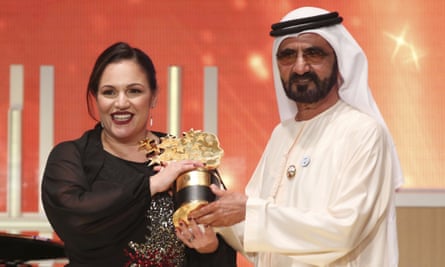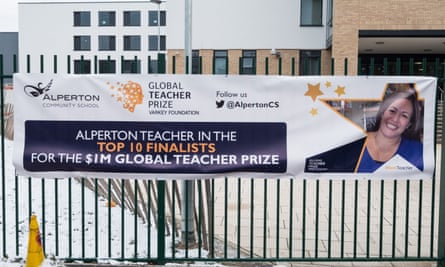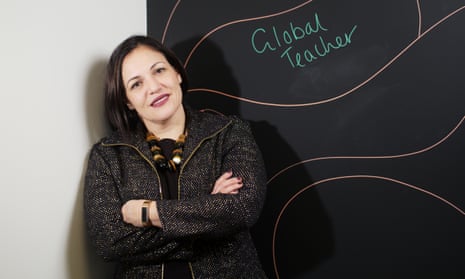Andria Zafirakou has been functioning on three hours’ sleep a night for weeks, but looks radiant. “It’s adrenaline, it’s excitement, it’s everything.” Nominated by current and former colleagues for the Varkey Foundation’s annual Global Teacher prize, dubbed the Nobel for teaching, last month Zafirakou learned she had been shortlisted from a field of more than 30,000 entries. She flew out to Dubai last week to join nine other finalists from all over the world for a star-studded awards ceremony hosted by Trevor Noah, and arrived home on Wednesday the winner of the $1m prize. The nominees were judged on, among other things, the progress made by pupils, achievements outside the classroom and in helping children become “global citizens”.
Politicians and dignitaries, the media and 100 of her schoolchildren were waiting to welcome her at Heathrow, from where she was whisked straight to parliament to meet Theresa May. The prime minister and education secretary’s praise for the arts and textiles teacher could not have been more lavish; she is, declared Damian Hinds, “truly inspiring”.
Zafirakou still hasn’t made it home to Brent, north-west London, when we meet later that day. The 39-year-old has the dazed air of a woman who barely recognises herself as she stares at her photo on the front of London’s Evening Standard. “My whole life has been transformed,” she laughs breathlessly. Amid all the wonderment of her fairytale week, however, there is one obvious irony. Had Zafirakou prioritised the targets the government sets for her profession, and focused all her energies on its official performance measures, she would never have been considered for the award. She won, instead, by being the kind of teacher our education system actively discourages.
Zafirakou has spent her 12-year career at Alperton Community secondary school in Brent, teaching some of the most disadvantaged, ethnically diverse children in the country. She suspects most of us couldn’t “have a clue” about the depth of deprivation she sees in her classroom every day. “This is what deprivation looks like. Deprivation is when you have got six or seven separate families living in one house, sleeping one family to a room, sharing one bathroom and rotating the use of the kitchen. I had a girl who was truanting in my class, so I investigated and found it was because she had to go home during the middle of my lesson and cook for her family because that was their slot on the rota.” Children routinely arrive at school hungry and dirty – “I’ve put clothes in the washing machine for the kids, and we provide a free breakfast to every child” – while gang violence haunts the school gates.
These are the very conditions that put so many people off teaching, but when I ask if she wouldn’t rather teach orderly, motivated pupils, she looks amused. “Bor-ing! No, I love trying to figure out: how can I get in to that child? How can I get them to trust me and how can I help them? Trying to figure out, right, OK, that didn’t work, what do I need to try now? I love that.”

To that end, Zafirakou taught herself phrases in many of the 35 languages spoken by her pupils. She set up a female cricket club for girls from conservative faith backgrounds, and rescheduled after-school clubs, so that children burdened with domestic duties all week could attend at weekends. She uses art to unlock pupils’ creativity and confidence, visits their homes to understand their family lives, and personally escorts them off the school premises on to buses at the end of the day, to protect them from violence. Her school teaches mindfulness, offers yoga classes, runs a boxing club, and is ranked in the top 1 to 5% of all schools in the UK for improving children’s achievement.
This approach is the opposite of the prevailing educational wisdom, famously pioneered by Mossbourne Academy in Hackney, east London, that what kids like those in Zafirakou’s class need is not silly ideas about freedom and creativity, but old-fashioned structure, discipline and academic rigour. Once ministers saw Mossbourne’s tough regime get children from council estates into Oxbridge, politicians in all parties deduced that the real problem wasn’t poverty, but “poverty of expectations”. This consenus allowed Michael Gove to rewrite the national curriculum in his own childhood’s elite private school image, ditching subjects such as drama for Latin and grammar, all in the name of egalitarianism. If the Mossbourne model works, why does Zafirakou take such a radically different approach?
“How will those children deal with the mental health issues that they’re going to get from that system? It’s like a conveyor belt of stress,” she challenges. “How are those children going to be able to nourish themselves, and find ways of letting their anxieties out, or just being happy, being creative – socialising and building skills of resilience or perseverance?” Brent does have schools modelled on Mossbourne, she says, “and parents are withdrawing their children and putting them into our school”.
To prioritise extracurricular clubs and pastoral care would strike some educationalists as a well-meant but misguided disservice to children perfectly capable of academic excellence, if only they were pushed instead of patronised.
“I have no problem with expecting the same from these kids as we do of kids from Eton. No problem. But did these kids have a breakfast in the morning? Did these kids watch their mum and dad beating each other up? So for me, a success for some of our children is: ‘He came into school, oh my God, he came into school.’ It’s great to say every child should have the same potential, but you need to know the personal background and the lives of your children, and how different and complex they are.”
Zafirakou takes great exception to the popular view that multiculturalism is at best a big problem, at worst, a dangerously failed experiment, and that immigrant children will never integrate if schools accommodate their different cultural identities. “When they come into this huge, intimidating building, if you say to them ‘namaste’ or ‘vanakkam’, you see their faces light up. It means that you get them, that you’re interested in them, that you are welcoming them, and that you appreciate their identity, their background – and they glow. Then what happens there, you’ve got complete and utter engagement from the parents. They will come in whenever you want them. We have a 95% minimum turnout for parents’ evenings.”
She applies the same principle to her lessons, introducing immigrant pupils to the great art of their birth country, rather than to the white European classics Gove wanted every child to study. “Kids won’t engage with that,” she says simply. “So first of all, connect them with their identity, their own history, their own culture. Show them what it’s about and how you can celebrate it. Then you have a sense of pride. Once you have that pride, then you can say: ‘This is what happened in the Renaissance’; ‘This is impressionism’.”
As the government wants schools to perform best in Stem subjects (science, technology, engineering and maths), and has excluded some arts subjects from the league tables, a lot of schools have given up teaching the arts altogether. When budgets are being cut, to spend money teaching GCSE drama, say, could be considered an unnecessary extravagance. Zarifakou’s weary smile suggests this is not the first time this has been put to her.

“Isn’t it funny that if you go to a private school, the parents will not tolerate their children not doing an art, not taking up a musical instrument, because they understand how important it is to be a child that has got many skills and these subjects build life skills? They help children communicate. They help them establish their own characters. They help to really challenge them and take them out of their comfort zones, because they’ve got to solve problems with these subjects. So the social skills you build up with them, being able to talk about your work confidently, being able to evaluate a piece of work, being able to talk about a role-play and completely break down a role-play – they are life skills. They are absolutely life skills that every child needs.”
Zarifakou always knew she would be an art teacher. “It wasn’t even a choice. Even from when I was at primary school my parents used to get complaints from my teachers saying: ‘She’s just so bossy, she tells us what to do.’ It was a vocation. I just knew.” Born in north-west London to Greek-Cypriot parents, and state-educated in Brent and Camden, she was promoted to deputy head of art within a year at Alperton, and is now associate deputy school head. Married to a fitness instructor, with two daughters aged 7 and 9, she is at work every morning by 7.30am, leaves at 5.30pm if lucky, often much later, and starts work again at home once the kids are in bed. “I don’t watch TV. I don’t ever even go into my living room. Even in my lunch, I’m working. The only time I break is when I’m in my bed.”
I tell her that while she was away in Dubai, a report on teachers’ pay was published. The average teacher earns £17.70 an hour. “See, that’s disgusting,” she says with feeling. When I ask what she would change if she were education secretary for a day, though, she doesn’t mention money, but proposes the introduction of a reward system of praise and appreciation for teachers, to acknowledge the extraordinary work they do.
A condition of the Global Teacher prize’s $1m pot is that the winner continues to teach for five years, but this clause strikes me as laughably unnecessary. Zafirakou plans to spend the money on projects to promote the arts, both in the school and the wider community of Brent, but I’m not sure the money has even fully sunk in. She seems to be still trying to absorb her new status as the best teacher in the world – but when not dazed and reeling she is already thinking about how to use her new platform to influence education.
If she could go back in time to her first day as a teacher, and tell herself one thing she has learned about the job since then, what would it be?
She thinks carefully. “That it’s all about building relationships. Instead of worrying about teaching the curriculum or making sure that you’ve got a strict classroom environment, build your relationships first. Get your kids on board, connect with them, find out what it is that they’re interested in. Build the relationship, build that trust. And then everything else can happen.”
It occurs to me that this is exactly what business people always say about their jobs. So do bankers, estate agents, marketing executives, hedge fund managers. Why our education system is premised on an assumption that the same does not apply to teaching is a mystery, but Zafirakou thinks she can explain.
“We are too frightened. Some teachers feel that they need to know everything, and always be the person with the knowledge. But I think sometimes the most beautiful thing about being a teacher is when you ask the child to teach you.”

Comments (…)
Sign in or create your Guardian account to join the discussion